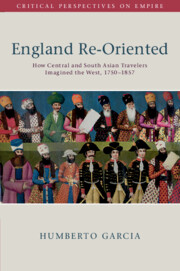Book contents
- England Re-Oriented
- Critical Perspectives on Empire
- England Re-Oriented
- Copyright page
- Dedication
- Epigraph
- Contents
- Figures
- Acknowledgments
- Note on Transliteration
- Introduction
- 1 The British Raj’s Mimic Men
- 2 A Bluestocking Romance
- 3 The Theater of Imperial Sovereignty
- 4 Loving Strangers in Ireland
- 5 Heavenly Bodies in Motion
- 6 Dreaming with Fairyland
- 7 The Making of a Mohamedan Gentleman
- Epilogue
- Book part
- Select Bibliography
- Index
5 - Heavenly Bodies in Motion
Performing Sexual Revolution in Mirza Abu Talib Khan’s Theatrical Metropolis
Published online by Cambridge University Press: 06 November 2020
- England Re-Oriented
- Critical Perspectives on Empire
- England Re-Oriented
- Copyright page
- Dedication
- Epigraph
- Contents
- Figures
- Acknowledgments
- Note on Transliteration
- Introduction
- 1 The British Raj’s Mimic Men
- 2 A Bluestocking Romance
- 3 The Theater of Imperial Sovereignty
- 4 Loving Strangers in Ireland
- 5 Heavenly Bodies in Motion
- 6 Dreaming with Fairyland
- 7 The Making of a Mohamedan Gentleman
- Epilogue
- Book part
- Select Bibliography
- Index
Summary
The fifth chapter examines how Ireland’s status as the bridgehead between Georgian Britain and Mughal India is also reflected in London performance venues dominated by women. I frame this transnational connection from the jaded viewpoint of Bengal ex-captain Thomas Williamson, who lambasts Abu Taleb Khan as an effeminate poser for bragging about his romantic intimacy with English noblewomen. Indeed, the Indo-Persian’s travelogue, Persian poems on London, the Diwan-i-Talib, and his essay “Vindication of the Liberties of the Asiatic Women” (printed in 1801 in European periodicals) was forged in two overlapping spaces of female sociability: the salon of the Duchess of Devonshire Georgiana Spencer, a politically outspoken socialite, and the London playhouses where star actresses ravished the Indian spectator with their professional artistry. Both spaces recall the skilled courtesans he would have known in Lucknow, mainly their perceived ability to debauch men. His subtle critique of elite British theatergoers who indulge in such impropriety aligns the feminized imperial capital with Persianate court rituals, panicking racist chauvinists like Williamson.
Keywords
- Type
- Chapter
- Information
- England Re-OrientedHow Central and South Asian Travelers Imagined the West, 1750–1857, pp. 170 - 211Publisher: Cambridge University PressPrint publication year: 2020



